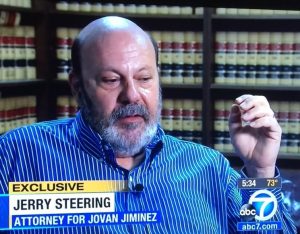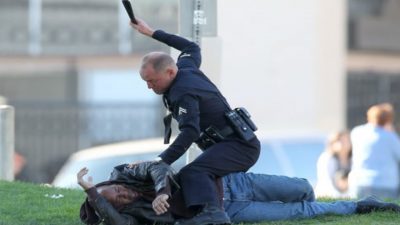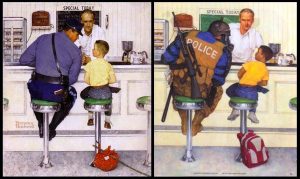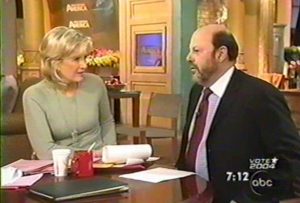PREFACE:
THE BIGGEST IMPEDIMENT TO OBTAINING JUSTICE FOR YOUR FALSE ARREST; JUROR SYMPATHY FOR AND FAITH IN THE POLICE.
Modern police agencies are afraid of losing their “power” in, and over, a community. That “power” base, their ability to influence the politicians and the public, is based in large part, on the public “supporting the police”. If you doubt that built-in police bias in the community, just ask 50 prospective jurors why they think that someone becomes a police officer and 49 of them will say “To serve and protect”.
That automaton type of popular support is based upon a belief by the body politic, that: 1) police officers are well trained and know and respect your Constitutional rights, 2) they’re basically honest, 3) that only a small percentage of them would commit perjury, 4) that the force that the police use on people is almost always justified (if not legally, then morally), and 5) that the police are capable of policing themselves. Although none of these beliefs are accurate, one cannot ignore the belief system of the majority of the white / affluent American populace, in understanding why police officers routinely, and without a second thought, falsely arrest civilians, and commit other outrages against innocents.
| Police Misconduct Specialties: | ||
|
|
|
Wrongful police beatings, accompanied by their sister “false arrests”, are a common and every day occurrence. These beating / arrests are no longer limited to persons of color. Soccer Moms, airline pilots and school teachers, beware: because of the great (and ever expanding) powers being given to police officers by the Supreme Court, described below, in a very real way, you no longer have the right to question, protest or challenge police actions, since to do so usually results in your being physically abused and falsely arrested on trumped of charges of essentially, “Contempt Of Cop”; (i.e. maybe not getting on the ground fast enough, or failing to walk-over to the officer fast enough; some type of failing the attitude test.)
Unfortunately, because of institutional pressures (i.e. “ratting out fellow officer not a good career move) and the obvious political and practical consequences of not backing-up the their fellow officers, the norm in today’s police profession, is for peace officers to falsely arrest civilians, and to author false police reports, to procure the bogus criminal prosecutions (i.e. to literally “frame”) of those civilians whose Constitutional rights and basic human dignity have been violated by them. After all; how would it look if a police officer beat you up, and didn’t arrest you.
Because most police officers, including those that step-over Constitutional “line in the sand” (i.e. beating another, falsely accusing civilians of crimes), are not true sociopaths, when they falsely charge you with a crime, it isn’t usually too serious of one. Most are bogus claims for violation of Cal. Penal Code § 148(a)(1), because the crime of “resisting or obstructing or delaying a peace officer who’s engaged in the performance of his/her duties” is incredibly ambiguous, and can (ingenuously or ignorantly) be applied to almost any conduct by a person (i.e. the defendant yelled at me for restraining [torturing] the “suspect”, so he delayed me from arresting the “suspect” because I had to look his way and take a protective stance in the events that the defendant charged at me.)
A frequent type of case in which the police falsely arrest an innocent person, is when you, your spouse, your lover, or your parent or child, call the police. Many times family members feel that they cannot control mentally ill (or mad or drunk / drugged-up) people, including and especially their relatives, so they call “911″; often believing that the ambulance and paramedics are going to come to actually help them. They may not have even thought that the police would be the responding agency, but when they find out that the police are there, trouble may be awaiting. Once the cops are on the scene, they are taught to take charge, and anyone challenging, or even questioning, the police giving orders or their authority to do so, even seemingly unreasonable ones, is going to either get physically abused by the police, or falsely arrested by the police, or both.
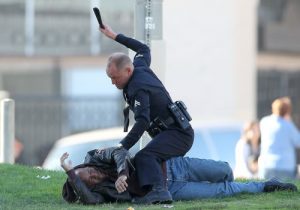 Also, many spouses or lovers call the police on each other, to get the other person out of the house; even for a night or two. The police are not there to solve your family problems, so when you make that call, don’t make it unless you want your spouse or lover to go to jail, or worse. Cops are not counselors. They take people to jail. That’s what they do. So remember, when you call the police on your parent, child, lover or spouse, the person who ends-up getting thumped and arrested by the police just may be you. “No” you say? The police won’t arrest me if I’m the party calling the police. You’re wrong. They don’t care who called. All that the seem to care about, is how you respond to them; regardless of how unreasonable they act. If then, they thump you and beat you up, the odds are, that the police won’t even investigate the subject matter that you called about. Now, all of their attention is on you, since they violated you.
Also, many spouses or lovers call the police on each other, to get the other person out of the house; even for a night or two. The police are not there to solve your family problems, so when you make that call, don’t make it unless you want your spouse or lover to go to jail, or worse. Cops are not counselors. They take people to jail. That’s what they do. So remember, when you call the police on your parent, child, lover or spouse, the person who ends-up getting thumped and arrested by the police just may be you. “No” you say? The police won’t arrest me if I’m the party calling the police. You’re wrong. They don’t care who called. All that the seem to care about, is how you respond to them; regardless of how unreasonable they act. If then, they thump you and beat you up, the odds are, that the police won’t even investigate the subject matter that you called about. Now, all of their attention is on you, since they violated you.
Also, do not use the police to get a border or a family member out of your house, unless the person is posing a “real” threat of imminent serious physical harm. If it’s that bad that you can’t stay in the house, then leave and get a hotel room, or just leave. The police cannot summarily evict / eject a civilian from a home in which they reside; whether they’re on the lease or not. In California, if a person resides at a home, only a Judge can force them to leave; either in the form of: 1) a Writ of Possession (the Court Order that the landlord gets in an “unlawful detainer“ action, to give to the Sheriff’s Department, to eject you from your home, when you don’t pay your rent); 2) a Civil Harassment Restraining Order (under Cal. Civ. Proc. Code § 527.6); 3) a Domestic Violence Restraining Order (under Cal. Family Code § 6320), and 4) an Emergency Protective Order in a criminal case (pursuant to Cal. Penal Code § 136.2.)
Almost any contact withe the police may result in your false arrest. The courts, the police and the body politic is usually antagonistic to your plight. Here is why and what we can do for you.
WHY DON’T WE KNOW THAT AS A PRACTICAL MATTER, WE LIVE IN A POLICE STATE?
When the “Gestapo” brutalized civilians, they didn’t abuse everyone. Many were career officers and otherwise acted respectfully and politely to the average German citizen. They had “Gestapo” family picnics. They went to neighborhood socials with the children. After all, since you weren’t opposing the Reich and weren’t Jewish, what did you have to worry about? They weren’t going to rouste everyone; just the undesirables.
The Gestapo also didn’t have to justify their actions toward “undesirables” (i.e. Jews, political opponents of the Reich) and they weren’t subject to either internal discipline or civil or criminal liability. They could search and seize you and your home at their whim. They could beat you, arrest you and subject you “enhanced interrogation techniques” to obtain confessions out of you; guilty or not.
Today’s police often act in a similar manner. In a very real way, the only difference between the Gestapo and today’s police is the paperwork; that today’s police officers have to justify what they did; lawful or not. This isn’t difficult to do.
If the arresting officers don’t sufficiently fabricate facts on their police reports that show that you committed a crime, their reviewing Sergeant will kick the report back to fill-in the necessary “key words” that will justify their conduct, and at least attempt to shift the blame from the police to you for their having to beat you and arrest you. Many modern police agencies (i.e. L.A. Sheriff’s Dept.) don’t require their deputies to record their contacts with you, but do require that the Patrol Sergeant obtain a non–Mirandized custodial “Administrative Use-Of-Force Investigation” recorded statement from you about the incident involving you getting beaten and falsely arrested.
If the patrol officers of our great country know anything about Fourth Amendment search and seizure jurisprudence, they know that by lying about your conduct by using certain “key words and phrases”, that they can literally justify anything. The police know that if they use force upon you or unreasonably seize you or otherwise violate you, that you are going to jail, notwithstanding your innocence and their guilt. The goal of all of this is to shift the blame to you. It is the great evil of our society; the real deal manifestation of the police state in action. That is where we step in.
JERRY L. STEERING; SUING THE POLICE FOR FALSE ARREST.
Jerry L. Steering is a Police Misconduct Attorney who sues police officers and deputy sheriffs, for, among other things, false arrests, excessive force and malicious criminal prosecutions. Mr. Steering sues police officers and their employing agencies for what have become to be known as “contempt of cop arrests”. “Contempt of cop arrests” mean the arrest of a civilian by a police officer for “failing the attitude test”; usually questioning police orders to one, or verbal challenge to a police officer claim or order, or simply letting the police that you know your rights (something that often results in the police showing you that in the real world, as a practical matter, unless you are willing to spend a lot of money [or have a video recording] you don’t have those rights that you thought you did).
The following is basic information on what a false arrest is, and it’s role in maintain the modern “police state” in American. There is a modern day epidemic of police violating your Constitutional rights (i.e unreasonably seizing and searching you or your property, using unreasonable force on you), and thereafter, procuring your criminal prosecution to protect themselves from civil liability, from internal discipline, and, in some cases, even criminal prosecution by state or federal authorities. Today’s police officers are not the kind, helpful and respectful police officers of the past. In modern America, the police simply have too much power, and many of them just can’t handle that awesome power.
WHEN THE CONSTABLE CAN SEIZE A MAN BECAUSE “HE DOESN’T LIKE THE CUT OF HIS JIB”; THE GENESIS OF THE MODERN POLICE STATE; SEIZURE OF CIVILIANS ON LESS THAN PROBABLE CAUSE TO ARREST.
 Today’s police have been “permitted” by the federal and state courts, to do just about anything that they want to do with you, and if you object or even protest police orders to you, many times you will be beaten, falsely arrested and maliciously prosecuted.
Today’s police have been “permitted” by the federal and state courts, to do just about anything that they want to do with you, and if you object or even protest police orders to you, many times you will be beaten, falsely arrested and maliciously prosecuted.
This is not “lefty” propaganda. This is the reality of what happens when the courts allow the police to detain you for almost any imaginable reason. This is the reality of what happens when the courts shave or chop-down the most basic constitutional protections. Chances are, that if you’re even reading this article, you don’t need any convincing. You know that the epidemic of police abusing civilians in this country is all so real. These days, if you somehow come into contact with today’s police officers and, and they start ordering your around, such as not proning yourself on the ground fast enough, or not following other “police commands” for you to do or not to do something, the police will take it upon themselves to use unreasonable force upon you. Once the police cross that line, there’s no going back. There’s no apologizing. You’re going to jail for some sort of “resistance offense”, and the police are going to make sure that you’re now going to be convicted for a crime against a police officer that never happened.
This typical tandem of outrages are all done in an effort by the police, and their accomplices, the District Attorney’s Office, to literally convict you of a crime that you didn’t commit, to protect the offending police officers from internal discipline, criminal liability, civil liability and obloquy. If you are reading this article, chances are that you’ve recently been falsely arrested, and are likely also at least waiting to find out if you’re going to be maliciously prosecuted, or, if the District Attorney’s Office will simply pass on prosecuting you.
The truth is, that when it comes to cases in which the employing public entity may be civilly liable for the Constitutional, statutory or common law violations of its officers or deputies, no matter what the truth is, no matter how maliciously you were treated, you, the victim of police outrages, are now the enemy to that agency and entity. You are a threat to the police. You are the one who some ambitious Deputy District Attorney will use to advance his/her standing with the local police agencies; often to someday make a run for Judge, or to otherwise advance their career at the District Attorney’s Office (every goes to the constable’s funeral; right or wrong).
All that being said, the officers / deputies of the agency who were guilty of brutalizing you, usually for fun (no joke) then usually at least attempt to procure your malicious criminal prosecution, to get that protection; those “two bites at the apple”. Two bites at the apple in the sense that as a matter of law, most if not all of the time, if you are convicted of any offense, not matter how de minimis, anything that the law proscribe, your arrest for some much more serious offense is deemed not to violate the protections of the Fourth Amendment to the United States Constitution. See, Atwater v. City of Lago Vista, 532 U.S. 318 (2001). Even Associate Justice Sandra Day O’Connor , a Conservative Jurist from Arizona and the first female Justice of the Supreme Court (appointed by President Reagan) thought that allowing the police to take you to jail and to search, you, your car and your effects, was outrageous.
So, when the police officer is done tasing you, pepper-spraying you, dog-chewing you, clubbing you, choking you out, punching you, kicking you, chicken-winging you, ball-kicking you or some other form of similarly anti-social and sadistic behavior, the police almost always at least attempt to procure your malicious criminal prosecution, to get that protection; to make them look like the victim, and you, the perpetrator.
Jerry L. Steering is a Police Misconduct Attorney who represents people like you; representing you in defense of your bogus criminal prosecution, and, thereafter, in the civil action that hopefully blossoms obtaining a “favorable termination”, into a winning civil action for violation of your constitutional rights.
Mr. Steering sues police officers and deputy sheriffs, for, among other things, police brutality / excessive force, false arrests, and malicious criminal prosecutions. Mr. Steering also defends some regular criminal cases, and bogus criminal actions; especially “Contempt of Cop” resistance offenses. Mr. Steering’s office serves Southern California, and, now, also the Eastern District of California. Mr. Steering has also represented the victims of government misconduct (i.e. the United States Department of Justice in places as far away as Alabama and Washington, D.C.) He also has been a Member of the State Bar of Georgia since 1984, and practiced law in Athens, Georgia after attending law school there at the University of Georgia. Mr. Steering has been defending bogus criminal cases brought by police agencies in California, since 1986.
FALSE ARRESTS FOR RESISTANCE OFFENSES; THE BLUE CODE OF SILENCE AND THE PROSECUTOR.
Police Misconduct is rampant and condoned and defended by the command structure of most, if not all,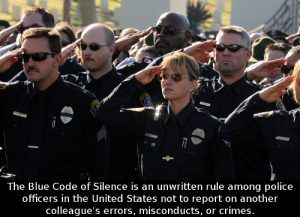 modern police agencies. There is a “Blue Code of Silence“ between and among peace officers throughout the nation, and everyone knows this.
modern police agencies. There is a “Blue Code of Silence“ between and among peace officers throughout the nation, and everyone knows this.
This is no startling revelation. The County of LA has itself released a report Commissioner by the Board of Supervisors, acknowledging the existence of, and actually condemning, the Sheriff’s Department’s own rogue gangs of sadistic jailers at the LA County Central Men’s Jail. See, The Citizens Commission on Jail Violence September 28, 2012.
A retired LA County Sheriff’s Department Captain reported to the LA Times, that the L.A. County Men’s Central Jail was, essentially, a torture chamber, run by these jailer gangs (tattoos of their gang symbols on their ankles and all) of sadistic sociopaths. Discipline for beatings was not existent, and torturing inmates was actually required for jailer gang initiation. See, “L.A. County sheriff’s official tells of jail brutality”, LA Times, July 7, 2012. See also, “L.A. County jail violence sheriff’s fault, panel says“, LA Times, September 28, 2012. Rival Sheriff’s Department jailer gangs even got into a rumble between the “3000 Boys” (the third floor jailers) and the “2000 Boys” (the second floor jailers)at a Sheriff’s Department Christmas party.
On February 10, 2016, Sheriff Baca pleaded guilty to violation of 18 U.S.C. § 1001(a)(2); lying to the FBI regarding his knowledge of a scheme in the Sheriff’s Department to intimidate an FBI agent who was investigating complaints of beatings of inmates by deputies at the LA County Jail, and to hide an FBI informant – jail inmate from his FBI handlers. Sheriff Baca pleaded guilty to that Indictment, for conspiring with his subordinately deputies and staff to obstruct an FBI investigation into allegations of sadistic beatings of inmates by deputies, and an overall culture of violence and brutality at the LA County Sheriff’s Department. That guilty plea to that single count was made pursuant to a plea bargain agreement between Sheriff Baca and the United States Department of Justice; the entity that obtained the Indictment against him and that criminally prosecuted him in United States District Court.
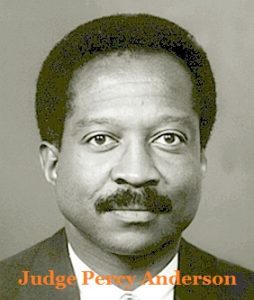
However, United States District Judge Percy Anderson said that was too lenient for the man who led the Sheriff’s Department during a period when deputies covered up for one another and violently attacked inmates.Days after withdrawing a guilty plea for lying during an FBI investigation into widespread abuses at the county jails, former LA County Sheriff Lee Baca was indicted Friday on more serious charges that could bring up to 20 years in prison. The former sheriff, who is in the early stages of Alzheimer’s disease, faced new charges of conspiracy, obstruction of justice and making false statements. The new Indictment against Sheriff Baca alleged that Sheriff Baca also met with now convicted former Undersheriff Paul Tanaka and other subordinates on Sept. 22, 2011, about approaching an FBI agent at her home, to intimidate her at her home, by threatening her with arrest if she pursued the FBI’s investigation into systemic torturing of inmates at the LA County Jail. The indictment alleged that four days later, two sheriff’s officials confronted the agent outside her home and threatened her with arrest. Baca denied any knowledge of this intimidation of the FBI agent, but the evidence, and his now withdrawn guilty plea to lying about not knowing, repudiate that claim.
Former Undersheriff Paul Tanaka, along with a retired LASD Captain, were indicted on May 13, 2015 by a federal Grand Jury for Obstructing and Conspiring to Obstruct a federal Grand Jury investigation of the rampant torturing of inmates at the LA County Jail (See, Paul Tanaka Indictment of May 13, 2015.)
That’s not the end of it. Former LASD Deputy Sheriff Noel Womack pleaded guilty in June of 2015 to federal charges of lying to the FBI about systemic LASD torturing and framing of inmates at the LA County Jails. In 2014, six LASD Deputy Sheriffs were convicted of obstructing the FBI’s investigation of the torturing of prisoners at the LA County Jails.
 Thereafter, on April 6, 2016, former LASD Undersheriff was convicted by a jury of violation of 18 U.S.C. § 371 (conspiring to obstruct justice) and 18 U.S.C. § 1503(a) (obstructing justice), for not only obstructing an FBI investigation into years of beatings and torturing of inmates at the L.A. County Jail, but also Tanaka and other high ranking Sheriff’s Department officials threatening one of the FBI agents involved in that investigation, with arrest for continuing that investigation. In his trial, Tanaka admitted that he still had the Minnesota Vikings Logo tattoo on his leg; a tattoo that he described as a member in a club; the “Vikings”; a tatoo that the federal courts have held is the gang taoo for a “neo-Nazi white supremacists gang within the LA County Sheriff’s Department. See, Thomas v. County of LA, 978 F.2d 504 (1992).
Thereafter, on April 6, 2016, former LASD Undersheriff was convicted by a jury of violation of 18 U.S.C. § 371 (conspiring to obstruct justice) and 18 U.S.C. § 1503(a) (obstructing justice), for not only obstructing an FBI investigation into years of beatings and torturing of inmates at the L.A. County Jail, but also Tanaka and other high ranking Sheriff’s Department officials threatening one of the FBI agents involved in that investigation, with arrest for continuing that investigation. In his trial, Tanaka admitted that he still had the Minnesota Vikings Logo tattoo on his leg; a tattoo that he described as a member in a club; the “Vikings”; a tatoo that the federal courts have held is the gang taoo for a “neo-Nazi white supremacists gang within the LA County Sheriff’s Department. See, Thomas v. County of LA, 978 F.2d 504 (1992).
Thereafter, on February 10, 2017, former LA County Sheriff Lee Baca was convicted of similar charges.
Nonetheless, the body politic tolerates the existence, and the perpetuation of an ongoing unwritten agreement among and between peace officers, to falsely report, and, if necessary, to thereafter conspire with officers who they may not yet even know, to falsely testify, about event(s), if the potential or apparent criminal, administrative and civil liability of a fellow officer is at stake. After all, in the primary category of cases that truly are “false arrests” in the most malevolent sense of the word, “Contempt of Cop cases”, the only reason that there’s an arrest of a civilian at all, is because the Constable has violated another (i.e. beaten-up / torture); usually to self-medicate rather frail and easily bruise-able egos.
II. CONTRARY TO POPULAR BELIEF, THE JURIES AND THE PUBLIC STILL HAS “FAITH” IN THE POLICE.
Modern police agencies are afraid of losing their “power” in, and over, a community. That “power” base (i.e. ability to influence the politicians and the public), is based in large part, on the public “supporting the police”. That popular support is based upon a belief by the body politic, that: 1) police officers are well trained and know and respect your Constitutional rights, 2) they’re basically honest, 3) that only a small percentage of them would commit perjury, 4) that the force that the police use on people is almost always justified (if not legally, then morally), and 5) that the police are capable of policing themselves. Although none of these beliefs are accurate, one cannot ignore the belief system of the majority of the white / affluent American populace, in understanding why police officers routinely, and without a second thought, falsely arrest civilians, and commit other outrages against innocents.
Wrongful police beatings, accompanied by their sister “false arrests”, are a common and every day occurrence. These beating / arrests are no longer limited to persons of color. Soccer Moms, airline pilots and school teachers, beware: because of the great (and ever expanding) powers being given to police officers by the Supreme Court, described below, in a very real way, you no longer have the right to question, protest or challenge police actions, since to do so usually results in your being physically abused and falsely arrested on trumped of charges of essentially, “Contempt Of Cop”; (i.e. maybe not getting on the ground fast enough, or failing to walk-over to the officer fast enough;
Thereafter, on February 10, 2017, former LA County Sheriff Lee Baca was convicted of similar charges.
Nonetheless, the body politic tolerates the existence, and the perpetuation of an ongoing unwritten agreement among and between peace officers, to falsely report, and, if necessary, to thereafter conspire with officers who they may not yet even know, to falsely testify, about event(s), if the potential or apparent criminal, administrative and civil liability of a fellow officer is at stake. After all, in the primary category of cases that truly are “false arrests” in the most malevolent sense of the word, “Contempt of Cop cases”, the only reason that there’s an arrest of a civilian at all, is because the Constable has violated another (i.e. beaten-up / torture); usually to self-medicate rather frail and easily bruise-able egos.
II. CONTRARY TO POPULAR BELIEF, THE JURIES AND THE PUBLIC STILL HAS “FAITH” IN THE POLICE.
Modern police agencies are afraid of losing their “power” in, and over, a community. That “power” base (i.e. ability to influence the politicians and the public), is based in large part, on the public “supporting the police”. That popular support is based upon a belief by the body politic, that: 1) police officers are well trained and know and respect your Constitutional rights, 2) they’re basically honest, 3) that only a small percentage of them would commit perjury, 4) that the force that the police use on people is almost always justified (if not legally, then morally), and 5) that the police are capable of policing themselves. Although none of these beliefs are accurate, one cannot ignore the belief system of the majority of the white / affluent American populace, in understanding why police officers routinely, and without a second thought, falsely arrest civilians, and commit other outrages against innocents.
Wrongful police beatings, accompanied by their sister “false arrests”, are a common and every day occurrence. These beating / arrests are no longer limited to persons of color. Soccer Moms, airline pilots and school teachers, beware: because of the great (and ever expanding) powers being given to police officers by the Supreme Court, described below, in a very real way, you no longer have the right to question, protest or challenge police actions, since to do so usually results in your being physically abused and falsely arrested on trumped of charges of essentially, “Contempt Of Cop”; (i.e. maybe not getting on the ground fast enough, or failing to walk-over to the officer fast enough; some type of failing the attitude test.)
Unfortunately, because of institutional pressures (i.e. “ratting out fellow officer not a good career move) and the obvious political and practical consequences of not backing-up the their fellow officers, the norm in today’s police profession, is for peace officers to falsely arrest civilians, and to author false police reports, to procure the bogus criminal prosecutions (i.e. to literally “frame”) of those civilians whose Constitutional rights and basic human dignity have been violated by them. After all; how would it look if a police officer beat you up, and didn’t arrest you. Because most police officers, including those that step-over Constitutional “line in the sand” (i.e. beating another, falsely accusing civilians of crimes), are not true sociopaths, when they falsely charge you with a crime, it isn’t usually too serious of one. Most are bogus claims for violation of Cal. Penal Code § 148(a)(1), because the crime of “resisting or obstructing or delaying a peace officer who’s engaged in the performance of his/her duties” is incredibly ambiguous, and can (ingenuously or ignorantly) be applied to almost any conduct by a person (i.e. the defendant yelled at me for restraining [torturing] the “suspect”, so he delayed me from arresting the “suspect” because I had to look his way and take a protective stance in the events that the defendant charged at me.)
A frequent type of case in which the police falsely arrest an innocent person, is when you, your spouse, your lover, or your parent or child, call the police. Many times family members feel that they cannot control mentally ill (or mad or drunk / drugged-up) people, including and especially their relatives, so they call “911″; often believing that the ambulance and paramedics are going to come to actually help them. They may not have even thought that the police would be the responding agency, but when they find out that the police are there, trouble may be awaiting. Once the cops are on the scene, they are taught to take charge, and anyone challenging, or even questioning, the police giving orders or their authority to do so, even seemingly unreasonable ones, is going to either get physically abused by the police, or falsely arrested by the police, or both.
Also, many spouses or lovers call the police on each other, to get the other person out of the house; even for a night or two. The police are not there to solve your family problems, so when you make that call, don’t make it unless you want your spouse or lover to go to jail, or worse. Cops are not counselors. They take people to jail. That’s what they do. So remember, when you call the police on your parent, child, lover or spouse, the person who ends-up getting thumped and arrested by the police just may be you. “No” you say? The police won’t arrest me if I’m the party calling the police. You’re wrong. They don’t care who called. All that the seem to care about, is how you respond to them; regardless of how unreasonable they act. If then, they thump you and beat you up, the odds are, that the police won’t even investigate the subject matter that you called about. Now, all of their attention is on you, since they violated you.
Also, do not use the police to get a border or a family member out of your house, unless the person is posing a “real” threat of imminent serious physical harm. If it’s that bad that you can’t stay in the house, then leave and get a hotel room, or just leave. The police cannot summarily evict / eject a civilian from a home in which they reside; whether they’re on the lease or not. In California, if a person resides at a home, only a Judge can force them to leave; either in the form of: 1) a Writ of Possession (the Court Order that the landlord gets in an “unlawful detainer“ action, to give to the Sheriff’s Department, to eject you from your home, when you don’t pay your rent); 2) a Civil Harassment Restraining Order (under Cal. Civ. Proc. Code § 527.6); 3) a Domestic Violence Restraining Order (under Cal. Family Code § 6320), and 4) an Emergency Protective Order in a criminal case (pursuant to Cal. Penal Code § 136.2.)
III. “FAILING THE ATTITUDE TEST”: A FREQUENT REASON FOR FALSE ARRESTS BY POLICE OFFICERS.
“Contempt Of Cop“cases, are bogus criminal actions, brought against innocents by criminal prosecutors, for essentially, “bruised ego” violations. The “ego bruising”, is really nothing more than a civilian not immediately, and without protest or question, getting-down on the ground in a proned position, or not doing something that the officer wants you to do (lawful, reasonable or not) immediately, and without question or protest. The Constable‘s “ego” is typically “bruised”, by your conduct, such as: 1) asserting your Constitutional rights, or 2) claiming knowledge of them, or 3) asking the Constable why you’re being ordered to lie down on the ground while your chest is being illuminated by the red spot of a pistol or rifle targeting device; 4) telling the Constable that you have a medical condition that makes it difficult or painful to get on the ground; 5) telling the Constable that he can’t do something (i.e. can’t go in my house without a warrant; you can’t make me go inside or come outside); 6) failing to consent to an entry or a search; and 7) not exiting your house when ordered to do so (even though the police generally can’t order you to exit a private residence; save probable cause to arrest for serious dangerous felony, coupled with an emergency; See, United States v. Al-Azzawy, 784 F.2d 890 (9th Cir. 1985) and Elder v. Holloway, 510 U.S. 510 (1994.) These are but a few examples. The list is endless, but the theme is the same. Failing to immediately do whatever the police tell you to do, without protest, challenge or remarks, often will result in your being beaten-up, falsely arrested, and maliciously criminally prosecuted.
These, “Contempt Of Cop“ cases, typical involve the police using force upon persons (i.e. beating them) and/or falsely arresting them, and then inventing bogus allegations of violations various “Contempt Of Cop“ statutes, such as violations of: 1) Cal. Penal Code § 148(a)(1) (resisting / obstructing / delaying peace officer [commonly called “resisting arrest”]; the most abused statute in the Penal Code; 2) Cal. Penal Code § 240/241(c) (assault on a peace officer); 3) Cal. Penal Code § 242 / 243(b) (battery on a peace officer); and 4) Cal. Penal Code § 69 (interfering with public officer via actual or threatened use of force or violence.) Cal. Penal Code § 69 is a “wobbler”; a California public offense that may be filed by the District Attorney’s Office as either a felony or a misdemeanor. In OC, Riverside County and LA County, allegations of violation of Cal. Penal Code § 69 are usually filed as misdemeanors. In San Bernardino County, however, allegations of violation of Cal. Penal Code § 69 are filed as felonies much more often than her sister counties. If they shoot you, they may even charge you with Cal. Penal Code § 245(d); assault on a peace officer in a manner likely to result in great bodily injury.
IV. POLICE INCOMPETENCE: A FREQUENT REASON FOR FALSE ARRESTS BY POLICE OFFICERS.
THE POLICE ARE NOT PROPERLY TRAINED ON FOURTH AMENDMENT SEARCH AND SEIZURE LAWS DEALING WITH ARRESTS, DETENTIONS AND SEARCHES.
Believe it or not, most experienced police officers have a pretty good functional understanding of basic fourth amendment search and seizure issues. For example, police academy training about basic street contacts with civilians includes the following:
- Detentions of persons (inside and outside of homes);
- Arrests of persons (with and without a warrant, and inside and outside of homes);
- The use of force on persons (pre-trial detainees and convicts);
- Probation searches (inside and outside of homes);
- Parole searches(inside and outside of homes);
- Search warrants (obtaining and serving residential and commercial warrants);
- Pat-down searches;
- Warrantless searches of persons;
- Warrantless searches of vehicles;
- Warrantless searches of homes (i.e. exigent circumstances and emergency doctrine.)
Once you get past the basics, however, most police officers really don’t understand what the Constitution forbids them from doing. Police officers simply are not sufficiently trained to properly act within with long established Constitutional constraints on them. It takes years for lawyers and judges to understand fourth amendment search and seizure issues, and they often disagree about whether certain conduct is, or is not, constitutional. Moreover, just like the rest of us, the cops make mistakes all of the time. They are human, and, therefore, false arrests by police officers are often the product of either sheer incompetence (i.e. the police arrest another for conduct that isn’t criminal), or of the police officer attempting to justify his/her unlawful conduct against a civilian (i.e. provoking verbal remonstrance, and then beating-up the civilian for protesting), by arresting, and then framing their victims (i.e. authoring false police reports, suborning and committing perjurious court testimony, concealing exculpatory evidence) of his federal criminal (18 U.S.C. § 242), and otherwise tortious misconduct.
FALSE ARRESTS AND THE RISE OF THE POLICE STATE IN AMERICA; ATWATER V. CITY OF LAGO VISTA.
If a police officer arrests you for any violation of law, even a parking ticket or a seat-belt violation, actually taking you to jail and booking you does not violate the Fourth Amendment; at least since 2001. See, Atwater v. City of Lago Vista, 532 U.S. 318 (2001) (arrest for violation of Texas seat-belt statute that carries a maximum $50.00 fine and no jail, not violative of the Fourth Amendment’s prohibition against “unreasonable searches and seizures”.)(See also, however, stinging Dissent by Justice O’Connor in Atwater:
 “Such unbounded discretion [to arrest for even the most trivial offense] carries with it grave potential for abuse. The majority takes comfort in the lack of evidence of an epidemic of unnecessary minor-offense arrests. Ante, at 33, and n. 25. But the relatively small number of published cases dealing with such arrests proves little and should provide little solace. Indeed, as the recent debate over racial profiling demonstrates all too clearly, a relatively minor traffic infraction may often serve as an excuse for stopping and harassing an individual. After today, the arsenal available to any officer extends to a full arrest and the searches permissible concomitant to that arrest. An officers subjective motivations for making a traffic stop are not relevant considerations in determining the reasonableness of the stop. See Whren v. United States, supra, at 813. But it is precisely because these motivations are beyond our purview that we must vigilantly ensure that officers post stop actions which are properly within our reach comport with the Fourth Amendments guarantee of reasonableness . . . . The Court neglects the Fourth Amendments express command in the name of administrative ease. In so doing, it cloaks the pointless indignity that Gail Atwater suffered with the mantle of reasonableness. I respectfully dissent.” Atwater v. City of Lago Vista, 532 U.S. 318 (2001) O’Connor, J., Dissenting.
“Such unbounded discretion [to arrest for even the most trivial offense] carries with it grave potential for abuse. The majority takes comfort in the lack of evidence of an epidemic of unnecessary minor-offense arrests. Ante, at 33, and n. 25. But the relatively small number of published cases dealing with such arrests proves little and should provide little solace. Indeed, as the recent debate over racial profiling demonstrates all too clearly, a relatively minor traffic infraction may often serve as an excuse for stopping and harassing an individual. After today, the arsenal available to any officer extends to a full arrest and the searches permissible concomitant to that arrest. An officers subjective motivations for making a traffic stop are not relevant considerations in determining the reasonableness of the stop. See Whren v. United States, supra, at 813. But it is precisely because these motivations are beyond our purview that we must vigilantly ensure that officers post stop actions which are properly within our reach comport with the Fourth Amendments guarantee of reasonableness . . . . The Court neglects the Fourth Amendments express command in the name of administrative ease. In so doing, it cloaks the pointless indignity that Gail Atwater suffered with the mantle of reasonableness. I respectfully dissent.” Atwater v. City of Lago Vista, 532 U.S. 318 (2001) O’Connor, J., Dissenting.
FALSE ARREST BY PEACE OFFICER – FEDERAL LAW – QUALIFIED IMMUNITY FROM SUIT FOR FALSE ARRESTS WHEN NO PRIOR EXACTING PRECEDENT.
Under the Qualified Immunity Doctrine, so long as a reasonably well trained officer could have believed that a person’s conduct constituted a crime, the officer who actually violated the Constitutional rights of another is nonetheless immune from being liable for damages caused by the officer’s Constitutional violation: “The qualified immunity analysis involves two separate steps. First, the court determines whether the facts show the officers conduct violated a constitutional right. Saucier v. Katz, 533 U.S. 194, 201 (2001). If the alleged conduct did not violate a constitutional right, then the defendants are entitled to immunity and the claim must be dismissed. However, if the alleged conduct did violate such a right, then the court must determine whether the right was clearly established at the time of the alleged unlawful action. Id. A right is clearly established if a reasonable official would understand that what he is doing violates that right. Id. at 202. If the right is not clearly established, then the officer is entitled to qualified immunity. While the order in which these questions are addressed is left to the courts sound discretion, it is often beneficial to perform the analysis in the sequence outlined above. Pearson v. Callahan, 129 S.Ct. 808, 818 (2009). Of course, where a claim of qualified immunity is to be denied, both questions must be answered.” Hopkins v. Bonvicino, 573 F.3d 752 (9th Cir. 2009.)
These days, qualified immunity for false arrests are so common, that they almost make false arrest cases impossible to win.
FALSE ARREST CASES – WHAT EXACTLY, IS A FALSE ARREST?
CALIFORNIA LAW ON FALSE ARREST BY PEACE OFFICER – ELEMENTS AND PROOF – CALIFORNIA LAW.
A “false arrest” is the same “tort” as a “false imprisonment” under California law. In a nutshell, an arrest by a peace officer in California is lawful if it’s either made pursuant to a facially valid warrant, or when the police have probable cause to believe that another has committed a crime. Unlike federal law, under California law, the burden is on the police to justify false arrest / false imprisonment of you at a civil trial (See, California Civil Jury Instructions (“CACI”) 1401 [False Arrest by Peace Officer Without Warrant] and 1402 [Peace Officer’s Justification / Defense To Claim Of False Arrest].) Under California law, a peace officer (i.e. police officer or deputy sheriff) may arrest another for a felony for which the officer has “probable cause” to believe person committed, or may arrest another for a misdemeanor that was committed in their presence (See, Cal. Penal Code § 836.) “Presence is not mere physical proximity but is determined by whether the offense is apparent to the officers senses”. People v. Sjosten, 262 Cal.App.2d 539, 543-544 (1968″.) An officer can arrest a civilian, upon probable cause, for any felony; committed in the presence of an officer or not. Cal. Penal Code § 836. However, it does not violate the fourth amendment, for an officer to arrest for a misdemeanor that was committed outside of the presence of the officer, even though such an arrest violates California state law.
FALSE ARREST BY PEACE OFFICER – NO “QUASI-QUALIFIED IMMUNITY” UNDER CALIFORNIA LAW NOT YET.
Cal. Penal Code § 847(b) provides: “There shall be no civil liability on the part of, and no cause of action shall arise against, any peace officer . . . acting within the scope of his or her authority, for false arrest or false imprisonment arising out of any arrest under any of the following circumstances: (1) The arrest was lawful, or the peace officer, at the time of the arrest, had reasonable cause to believe the arrest was lawful.” Although police civil defendants have argued that Section 847(b)(1) immunizes peace officers for false arrests like the “qualified immunity” provided for police false arrest civil defendants federal court, that code section cannot be reasonably construed that way. The first part of Section 847(b)(1) (“The arrest was lawful”), logically changes nothing, for if the arrest was lawful, then there is no liability under anyone’s theory; kind an unintended legal redundancy. The second part of Section 847(b)(1) (“the peace officer, at the time of the arrest, had reasonable cause to believe the arrest was lawful”), could only reasonably be meant to apply to a situation, where an officer arrested a civilian based upon either: 1) an arrest warrant that did issue, but for which there was no probable cause to have issued (the officer who obtained the arrest warrant on insufficient grounds committed the fourth amendment violation, and is liable for the false arrest, unless otherwise protected, such as by “qualified immunity“), or 2) when the officer had “reasonable cause”, which is essentially a term equivalent to “probable cause” under the jury instructions that are used at the trial of this particular tort (See, CACI 1402; . . . arrest lawful if . . . “reasonable cause to believe that the plaintiff committed a crime“ is the standard for whether a peace officer’s arrest of a civilian was lawful.) Therefore, logically, Section 47(b)(1) provides no immunity for California peace officers for a false arrest. That does not mean, however, that a state or federal judge won’t disagree with that proposition. It is not fully developed under either California law, or by the federal district court’s interpretation of that statute.
FALSE ARREST BY PEACE OFFICER – FEDERAL LAW – GENERALLY.
A “false arrest” under federal law, is considered a violation of a person’s right to be free from an “unreasonable seizure” of their person under the Fourth Amendment (See, Ninth Circuit Court of Appeals Model Civil Jury Instruction for Arrest Without Probable Cause Or Warrant.) The United States Supreme Court has defined a “seizure of a person” as when a reasonable person would not feel free to leave the presence of police officers and to go about their business. See, United States v. Mendenhall, 446 U.S. 544 (1980.)
In 1871, in response to a letter to Congress by President Ulysses S. Grant, Congress enacted the “Third Enforcement Act” to enforce the newly enacted 14th Amendment, also know as the Ku Klux Klan Act (42 U.S.C. 1983). Section 1983 that gives any person whose federal Constitutional rights have been violated, 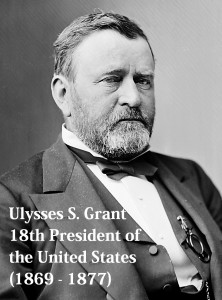 a right to sue, any person who violated those rights under the color of state law, in a United States District Court. Section 1983 lawsuits can also be brought in a state court of general jurisdiction; See, 42 U.S.C. 1988. Accordingly, a person who is falsely arrested by a peace officer (i.e. police officer, deputy sheriff, or some other officer who derives peace officer powers from state law), may sue the police officer under Section 1983, as well as under California state law. In federal court, in a civil Fourth Amendment “arrest without probable cause” case (a federal false arrest case), the jury is instructed at the end of the case, on the following definition of “probable cause”: “Probable cause exists when, under all of the circumstances known to the officer[s] at the time, an objectively reasonable police officer would conclude there is a fair probability that the plaintiff has committed or was committing a crime” (See, Ninth Circuit Court of Appeals Model Civil Jury Instruction 9.20, Arrest Without Probable Cause Or Warrant.)
a right to sue, any person who violated those rights under the color of state law, in a United States District Court. Section 1983 lawsuits can also be brought in a state court of general jurisdiction; See, 42 U.S.C. 1988. Accordingly, a person who is falsely arrested by a peace officer (i.e. police officer, deputy sheriff, or some other officer who derives peace officer powers from state law), may sue the police officer under Section 1983, as well as under California state law. In federal court, in a civil Fourth Amendment “arrest without probable cause” case (a federal false arrest case), the jury is instructed at the end of the case, on the following definition of “probable cause”: “Probable cause exists when, under all of the circumstances known to the officer[s] at the time, an objectively reasonable police officer would conclude there is a fair probability that the plaintiff has committed or was committing a crime” (See, Ninth Circuit Court of Appeals Model Civil Jury Instruction 9.20, Arrest Without Probable Cause Or Warrant.)
Therefore, that standard, whether “an objectively reasonable police officer would conclude there is a “fair probability” that the plaintiff has committed or was committing a crime”, is the standard that the propriety of an arrest, outside of the home is judged by, in federal court in the states comprising the Ninth Circuit Court of Appeals (Ninth Circuit Model Civil Jury Instruction 9.20). It doesn’t matter what the thousands of other cases, from the Supreme Court on down, say about what “probable cause” means. All that matters, is what a civil jury is going to be told is the standard that they should judge the facts by, in their deliberations (a civil jury is the “Judge of the facts” trier of fact, and the District Judge is the “Judge of the law”.) Some justices say that the words “probable cause“, are found in the text of the fourth amendment itself, and that is the standard for a seizure of a person by the government that was established by the Founding Fathers at the Constitutional Convention in Philadelphia in 1791; not reasonable suspicion:
“MR. JUSTICE DOUGLAS, dissenting. I agree that petitioner was “seized” within the meaning of the Fourth Amendment. I also agree that frisking petitioner and his companions for guns was a “search.” But it is a mystery how that “search” and that “seizure” can be constitutional by Fourth Amendment standards unless there was “probable cause” [n1] to believe that (1) a crime had been committed or (2) a crime was in the process of being committed or (3) a crime was about to be committed. The opinion of the Court disclaims the existence of “probable cause.” If loitering were in issue and that [p36] was the offense charged, there would be “probable cause” shown. But the crime here is carrying concealed weapons; [n2] and there is no basis for concluding that the officer had “probable cause” for believing that that crime was being committed. Had a warrant been sought, a magistrate would, therefore, have been unauthorized to issue one, for he can act only if there is a showing of “probable cause.” We hold today that the police have greater authority to make a “seizure” and conduct a “search” than a judge has to authorize such action. We have said precisely the opposite over and over again. [n3] [p37] In other words, police officers up to today have been permitted to effect arrests or searches without warrants only when the facts within their personal knowledge would satisfy the constitutional standard of probable cause. At the time of their “seizure” without a warrant, they must possess facts concerning the person arrested that would have satisfied a magistrate that “probable cause” was indeed present. The term “probable cause” rings a bell of certainty that is not sounded by phrases such as “reasonable suspicion.” Moreover, the meaning of “probable cause” is deeply imbedded in our constitutional history. As we stated in Henry v. United States, 361 U.S. 98, 100-102: The requirement of probable cause has roots that are deep in our history. The general warrant, in which the name of the person to be arrested was left blank, and the writs of assistance, against which James Otis inveighed, both perpetuated the oppressive practice of allowing the police to arrest and search on suspicion. Police control took the place of judicial control, since no showing of “probable cause” before a magistrate was required. That philosophy [rebelling against these practices] later was reflected in the Fourth Amendment. And as the early American decisions both before and immediately after its adoption show, common rumor or report, suspicion, or even “strong reason to suspect” was not adequate to support a warrant [p38] for arrest. And that principle has survived to this day. . . . . . . It is important, we think, that this requirement [of probable cause] be strictly enforced, for the standard set by the Constitution protects both the officer and the citizen. If the officer acts with probable cause, he is protected even though it turns out that the citizen is innocent. . . . And while a search without a warrant is, within limits, permissible if incident to a lawful arrest, if an arrest without a warrant is to support an incidental search, it must be made with probable cause. . . . This immunity of officers cannot fairly be enlarged without jeopardizing the privacy or security of the citizen. The infringement on personal liberty of any “seizure” of a person can only be “reasonable” under the Fourth Amendment if we require the police to possess “probable cause” before they seize him. Only that line draws a meaningful distinction between an officer’s mere inkling and the presence of facts within the officer’s personal knowledge which would convince a reasonable man that the person seized has committed, is committing, or is about to commit a particular crime. In dealing with probable cause, . . . as the very name implies, we deal with probabilities. These are not technical; they are the factual and practical considerations of everyday life on which reasonable and prudent men, not legal technicians, act. Brinegar v. United States, 338 U.S. 160, 175. To give the police greater power than a magistrate is to take a long step down the totalitarian path. Perhaps such a step is desirable to cope with modern forms of lawlessness. But if it is taken, it should be the deliberate choice of the people through a constitutional amendment. [p39] Until the Fourth Amendment, which is closely allied with the Fifth, [n4] is rewritten, the person and the effects of the individual are beyond the reach of all government agencies until there are reasonable grounds to believe (probable cause) that a criminal venture has been launched or is about to be launched. There have been powerful hydraulic pressures throughout our history that bear heavily on the Court to water down constitutional guarantees and give the police the upper hand. That hydraulic pressure has probably never been greater than it is today. Yet if the individual is no longer to be sovereign, if the police can pick him up whenever they do not like the cut of his jib, if they can “seize” and “search” him in their discretion, we enter a new regime. The decision to enter it should be made only after a full debate by the people of this country.” Terry v. Ohio, 392 U.S. 1 (1968) Douglas,J. Dissenting.
Moreover, it does not matter what the arresting officer’s state of mind was, even if he was mistaken as to the crime committed, so long as in retrospect, a reasonably well trained officer would have believed that there was a “fair probability” that you committed a crime. The Closely Related Offense Doctrine; A Reasonable But Now Extinct Approach To Whether Civil Liability Attaches To An Arrest. The Ninth Circuit Court of Appeals used to employ a doctrine entitled the “Closely Related Offense Doctrine.” Under that doctrine, if an officer arrested a civilian for one particular crime, but the police officer didn’t have probable cause to have arrested the person was for that crime, if a reasonably well trained officer would have believed that probable cause existed to have arrested the person for some other crime that was “closely related” to the crime that the person was arrested for, then the arrest is valid under the “Closely Related Offense Doctrine.” Bingham v. City of Manhattan Beach, 341 F.3d 939 (9th Cir. 2003.) However, the “Closely Related Offense Doctrine” was overruled by the U.S. Supreme Court in Devenpeck v. Alford, 543 U.S. 146 (2004.) The Ninth Circuit Court of Appeals more recently cut-back on the scope of the effect of Devenpeck v. Alford, by limiting the type of cases that the officers could have righteously arrested one for, to crimes that state law permits a custodial arrest, such as a misdemeanor or a felony. See, Edgerly v. City and County of San Francisco, 599 F.3d 946 (9th Cir. 2010.) This decision seems to ignore the United States Supreme Court Case of Atwater v. City of Lago Vista, 532 U.S. 318 (2001), that held that a custodial arrest by a peace officer didn’t violate the Fourth Amendment, even if the crime that the person was arrested for was not one for which state law permits a custodial arrest. However, that’s the law in the Ninth Circuit at this time. “Our cases make clear that an arresting officers state of mind (except for the facts that he knows) is irrelevant to the existence of probable cause. . . . That is to say, his subjective reason for making the arrest need not be the criminal offense as to which the known facts provide probable cause. As we have repeatedly explained, the fact that the officer does not have the state of mind which is hypothecated by the reasons which provide the legal justification for the officer’s action does not invalidate the action taken as long as the circumstances, viewed objectively, justify that action. . .. [T]he Fourth Amendments concern with reasonableness allows certain actions to be taken in certain circumstances, whatever the subjective intent.” See, Devenpeck v. Alford, 543 U.S. 146, 15253 (2004.)
Accordingly, the arresting police officers belief about what crime a person committed is irrelevant. All that matters is whether a reasonably well trained officer would have entertained a belief that the person arrested committed a crime; that is, the “reasonably well trained officer” in the abstract. If that fictional “reasonably well trained police officer” would not have believed that a crime had been committed, the arrested person may be able to obtain compensation for his/her false arrest. Many times an officer mistakenly believes that certain conduct is a crime, but it’s not (See, Tab above for “Police Misconduct News“, and the Section therein entitled “Possum Impossible”; the Lorenzo Oliver case; Ninth Circuit Court of Appeals holds that, as matter of law, no crime committed.) Other times, an officer arrests a person for a crime that he has no warrant or probable cause for, but, under the facts as the officer knew them, there was nonetheless a crime committed, that would have been apparent to the officer is he was familiar with that particular criminal statute. So long as a reasonably well trained officer would have believed that probable cause existed from the facts known to the arresting officer, the arrest is generally lawful. See, Devenpeck v. Alford, 543 U.S. 146, 152-53 (2004.)
WHY THE COPS CAN GET USUALLY GET AWAY WITH IT; THE JURORS.
 To attack the jury system is to attack an institution that has been the primary barrier between oppression and freedom in the English speaking world since 1215 (King John signing the Magna Carta.) in the EnglishThis is not an attack on the jury system. It is merely a reflection as to why in false arrest, unreasonable force and malicious prosecution cases, the way that a jury decides these type of cases is as much political, as it is an exercise in fact finding. The persons who ultimately get to sit on juries in these cases, have no real idea as to how police officers actually act, and have no idea how truly institutionally corrupt, police agencies really are when it comes to defending the County / City coffers and their and the politicians’ images. Many of them have an emotional predisposition to believe the police; no matter how many obvious falsehoods they may utter. They consider themselves “Pro-Police”, any often feel that the cops are getting a raw deal in the media, and need their support. With these kind of white / upper-middle class types, if a cop testifies under oath with a straight face, that’s it. You’re goose is cooked. Guilty. You’ve really got to prove that you’re innocent in these type of cases. Try convincing a Newport Beach Superior Court white affluent jury that you didn’t act rudely toward a peace officer, or somehow delay or obstructed the officer’s investigation of you, by exercising your right to not speak with the officer. The harmony of all of this, is that since Section § 148(a)(1) of the Penal Code (resisting / obstructing / delaying a peace officer in the lawful performance of their duties) doesn’t actually mean anything, and is so vague and amorphous, that a jury can make it fit their enmity for the accused; enmity created by the mere fact that you stand accused at all. In both civil and criminal cases, the parties have some say in the composition of the jury. The jury pool are supposedly called randomly, and the Court and the lawyers get to ask them questions. That part of a trial, questioning potential jurors, is called voir dire, that in French means, to speak the truth. Each side gets a certain numbers of peremptory challenges, that they can use to strike persons from sitting as jurors. In a federal court civil rights case, each side usually gets four peremptory challenges. So far, sounds fair. Here’s the rub.
To attack the jury system is to attack an institution that has been the primary barrier between oppression and freedom in the English speaking world since 1215 (King John signing the Magna Carta.) in the EnglishThis is not an attack on the jury system. It is merely a reflection as to why in false arrest, unreasonable force and malicious prosecution cases, the way that a jury decides these type of cases is as much political, as it is an exercise in fact finding. The persons who ultimately get to sit on juries in these cases, have no real idea as to how police officers actually act, and have no idea how truly institutionally corrupt, police agencies really are when it comes to defending the County / City coffers and their and the politicians’ images. Many of them have an emotional predisposition to believe the police; no matter how many obvious falsehoods they may utter. They consider themselves “Pro-Police”, any often feel that the cops are getting a raw deal in the media, and need their support. With these kind of white / upper-middle class types, if a cop testifies under oath with a straight face, that’s it. You’re goose is cooked. Guilty. You’ve really got to prove that you’re innocent in these type of cases. Try convincing a Newport Beach Superior Court white affluent jury that you didn’t act rudely toward a peace officer, or somehow delay or obstructed the officer’s investigation of you, by exercising your right to not speak with the officer. The harmony of all of this, is that since Section § 148(a)(1) of the Penal Code (resisting / obstructing / delaying a peace officer in the lawful performance of their duties) doesn’t actually mean anything, and is so vague and amorphous, that a jury can make it fit their enmity for the accused; enmity created by the mere fact that you stand accused at all. In both civil and criminal cases, the parties have some say in the composition of the jury. The jury pool are supposedly called randomly, and the Court and the lawyers get to ask them questions. That part of a trial, questioning potential jurors, is called voir dire, that in French means, to speak the truth. Each side gets a certain numbers of peremptory challenges, that they can use to strike persons from sitting as jurors. In a federal court civil rights case, each side usually gets four peremptory challenges. So far, sounds fair. Here’s the rub.
Most people who have actually seen police officers beat-up a civilian have a lasting terrible feeling about police misconduct. Almost invariably, when they are asked by the lawyers or the Court about whether their prior experience with police misconduct will cause them to be prejudice against either side, they almost always say “Yes.” Most such people who have seen police beatings and the false prosecutions of their friends, are so deeply affected, that they invariably tell the Court that they are biased against police officers (in this type of case), and that they cant really put-aside that bias and be completely fair and impartial. This is understandable. It’s like asking a juror who witnessed the raping of her friend, at gun point, by members of a particular motorcycle club, if he/she would feel biased against the defendant, who happens to be accused of rape, and of being a member of a biker gang; the same gang, that she watched raping her friend. Of course, the person is going to have a bias against the defendant. Once the prospective juror makes that statement, any such jurors are then routinely excused for cause from sitting on that jury.
Thus, the jurors who would more likely be favorable to the civil rights plaintiff (or criminal defendant accused of some crime against a peace officer), is excused for cause from sitting on the jury. The lawyer defending the case for the police doesn’t even had to use one of their jury peremptory challenges to get rid of that juror. All of the others jurors who do get to sit, are people who have never seen police misconduct; leaving a jury that, unfortunately, have no concept of the way that police, and police organizations, actually act.
Therefore, when Miss, Mrs. or Mr. Citizen gets falsely arrested, beaten-up or maliciously prosecuted by police agencies, and gets criminally prosecuted for conduct that often isn’t criminal (i.e. “creative use” of the California criminal statute Penal Code § 148(a)(1)), these “sanitized jurors” will generally not believe that the police really did what Miss, Mrs. or Mr. Citizen claim that they did, unless Miss, Mrs. or Mr. Citizen’s attorney can really prove otherwise; real proof; like a video, audio, or a bus load of highly observant nuns with photographic memories who testified about clearly indefensible police conduct. That’s why the jury system rigged against persons victimized by the police; because the only people who ever get to sit in judgment in these type of cases as jurors, are persons who have never had a bad experience with a police officer, or and who has not seen outrageous police conduct. Their life experience tells them something that’s just not true; that police officer don’t beat people up unless they did something to deserve it. You, therefore, need great proof to dispel that belief by jurors.
WHY THE COPS CAN GET USUALLY GET AWAY WITH IT; THE JUDGES.
All Article III federal Judges are appointed for life. It means, that unless a federal judge is impeached by the House of Representatives and removed by the Senate, they sit for life. The idea of lifetime appointment of Judges by the Founding Fathers of the United States is based on the notion that Judges aren’t supposed to be political weather vanes; that is, they’re not supposed to changes direction with the prevailing political winds. This is a good thing. A person should not be deprived of their Constitutional Rights because respecting their rights would be unpopular. However, there are drawbacks to this. The problem with lifetime appointment of Article III federal judges, is that if you get a bad one appointed, we’re stuck with him for life (See “The Robing Room“; a site where federal Judges are rated.) That is a bad thing. The problem with a “bad judge” is that one side or another, won’t get a fair trial. A trial based on the law; not on the Judges political leanings. Unfortunately, unfair trials, especially unfair in the Court’s rulings against civil rights plaintiffs, are far too common.
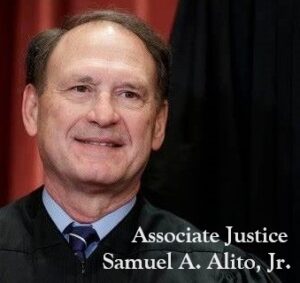 Take the case of the late United States District Judge Andrew Hauk. Judge Hauk was so against civil rights plaintiffs, especially police brutality plaintiffs, that the Ninth Circuit Court of Appeals ordered that could not longer preside over police misconduct cases because he wouldn’t give anyone suing the police a fair trial. As United States District Judge J. Spencer Letts, Judges can make a case come out anyway they want to; they just don’t. Well, Judge Letts was right about the first part, but not the second. Ask any experience trial lawyer, and they will tell you that your case has a much better chance of success if a particular Judge presides, and a much worse chance if another particular Judge presides. Why is this? Why would the Judge make a difference? Aren’t the Federal Rules of Evidence supposed be understandable and applied uniformly?
Take the case of the late United States District Judge Andrew Hauk. Judge Hauk was so against civil rights plaintiffs, especially police brutality plaintiffs, that the Ninth Circuit Court of Appeals ordered that could not longer preside over police misconduct cases because he wouldn’t give anyone suing the police a fair trial. As United States District Judge J. Spencer Letts, Judges can make a case come out anyway they want to; they just don’t. Well, Judge Letts was right about the first part, but not the second. Ask any experience trial lawyer, and they will tell you that your case has a much better chance of success if a particular Judge presides, and a much worse chance if another particular Judge presides. Why is this? Why would the Judge make a difference? Aren’t the Federal Rules of Evidence supposed be understandable and applied uniformly?
We’ll, yes, the Federal Rules of Evidence are understandable, but as persons with undefendable positions often say, “Don’t bring facts into this argument.” Unfortunately, the Judges appointed by Democrats are, on par, much more sympathetic to civil rights / police misconduct plaintiffs, than those appointed by the Republicans. That is a simple fact. It is not an endorsement of the Democratic Party Platform, or any particular Democrat. There, of course, are many fine Republican Senators. However, over all, just go through the federal judicial roster, and you will find that the Judges (state and federal) appointed by the Democrats are much better for civil rights / police misconduct plaintiffs, than those appointed by the Republicans. This is a fact of life. If you’re a Republican and are offended by this, we’re sorry. We don’t mean to offend anyone. We just speak the truth, and anyone involved in the system knows this. The fine Senators on the Senate Judicially Committee have actually resorted to filibustering a federal judicial nominees many Presidential nominees for Article III Judgeships; Democrats filibustering Republican nominees, and Republicans filibustering Democrat nominees.
Judges are not mere referees. They do call balls and strikes at trial (i.e. objections and whether to overrule or sustain the same), but they also define the strike zone, and the appellate Judges (i.e. Court of Appeals and the Supreme Court) re-write the rules of the game, all of the time. So, if you have a civil rights / police misconduct case, your chances of success often depend on what Judge you have. That why the cops get away with it; Conservative Judges.
FALSE ARREST CASES – DON’T CALL THE COPS UNLESS YOU WANT SOMEONE AT LEAST IN JAIL, OR VERY POSSIBLY DEAD.
All of use have broken some sort of law, but most of us don’t go around holding-up liquor stores. The odds are, that if you are inquiring about a police misconduct case, such as a false arrest case, that you fall into three basic categories of ways that the police came into contact with you, and then falsely arrested you, or worse.
WHAT YOU CAN DO.
Someone has to stand-up to the bullies of society, who think that using state police power to humiliate others, is funny, and makes them big men (or women.) There are thousands of others like you, who are good people, and have been somehow, for some reason that you could not have ever imagined, victimized by the government. It might as well be you. Stand-up for justice. Stand-up for our form of self-government. Stand-up for the spilled-blood of our fathers, who bravery died to prevent the very thing, that the government is doing to you right now. Click on “Home”, above, or the other pages shown, for the information or assistance that we can provide for you. If you need to speak with a lawyer about your particular legal situation, please call the Law Offices of Jerry L. Steering for a free telephone consultation. Also, if you have been the victim of a False Arrest or Excessive Force by a police officer, check our Section, above, entitled: “What To Do If You Have Been Beaten-Up Or False Arrested By The Police“.
Thank you, and best of luck, whatever your needs.
Law Offices of Jerry L. Steering
Jerry L. Steering, Esq.

